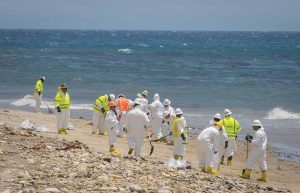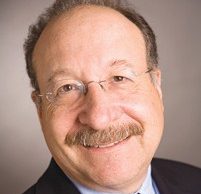
Workers donned protective gear to clean up the Refugio oil spill.
Plains All American Pipeline has allegedly been misleading those who seek compensation for losses they incurred following the Refugio oil spill, according to a motion filed in federal court on Dec. 15.
The motion asserts that Plains is asking the claimants to forfeit the right to file or take part in any other claim in order to receive payment in the interim.
In Plains’ settlement agreement and release, it asks the claimant to “RELEASE, ACQUIT and FOREVER DISCHARGE Plains of all claims related to the above-described injuries.”
But that is not required by law and the effects of the oil spill may take years to manifest, according to the motion.
The purpose of the Oil Pollution Act enacted after the Exxon Valdez oil spill in 1989 was to give short-term relief to the area damaged by an oil spill with a “quick infusion of cash,” the filing says.
The short-term payments are not intended to forfeit the right to pursue full compensation, according to the motion.
“The (OPA) provides that the payment of ‘short-term damages representing less than the full amount of damages to which the claimant ultimately may be entitled shall not preclude recovery by the claimant for damages not reflected in the paid or settled partial claim,’” the filing reads.
The motion cites settlement agreements used in the aftermath of the BP oil spill that state the claimant should confer with an attorney before signing. Plains’ agreements include no such wording and, therefore, should be considered invalid, according to the motion.
“Defendants’ apparent goal is to use that information vacuum to induce class members to compromise their claims or otherwise opt-out of the pending (class-action lawsuit), without Court supervision or oversight,” the motion reads.
The plaintiffs are asking the court to nullify any forfeiture of rights, require Plains to send more accurate information to the claimants, and regulate how Plains communicates directly and indirectly to the claimants.
“The Oil Pollution Act was enacted to supplement existing law by expanding the remedies available to oil spill victims, not as a shield for Plains to limit its liability,” the motion reads. “This Court should not allow Plains to use OPA as ‘cover’ to disseminate misleading information and as a platform to extinguish class members’ rights to full compensation.”
The lawsuit was filed in federal court by the law firms Keller Rohrback, Cappello & Noel and Lieff Cabraser Heimann & Bernstein on behalf of those who filed claims against Plains.
Plains has filed its own motion that disputes some of the legal claims the plaintiffs in the lawsuit have made against it.
Houston-based Plains owns the heavily corroded Line 901 that was responsible for the Refugio oil spill that fouled the Gaviota Coast. The pipeline leaked up to 142,800 gallons on May 19, according to Plains, which initially underestimated the spill.
The U.S. Department of Transportation’s Pipeline Hazardous Material Safety Administration is currently investigating Plains, which could take at least two years.
A consolidated class-action lawsuit filed against Plains represents homeowners aiming to recoup alleged losses in property value and anglers who couldn’t fish during the fishery closures, among others. Stockholders filed a separate class-action suit claiming Plains provided “false and misleading statements” regarding pipeline maintenance and monitoring.
Yet, taking on Big Oil is no small feat. The Western States Petroleum Association spent a record $8.9 million on lobbying in 2014, making it one of the largest and most powerful corporate lobbying groups in Sacramento.
Despite pending investigations, lawsuits and legislation, Plains says its long-term outlook is good. Plains CEO Greg Armstrong estimated the Refugio oil spill was a $257 million blunder, which factors in the emergency response and cleanup efforts as well as expected legal claims and potential settlements.
But the company would only shoulder $65 million of the $257 million because insurance would cover the rest, Armstrong said in an earnings report.
The plummeting price of oil will likely mean Plains will consolidate its operations over the next two to three years, Armstrong said during a presentation on Dec. 8 at the 2015 Wells Fargo Securities 14th Annual Energy Symposium in New York.
Yet, he expects a rebound in production activity in 2017 and beyond.
“PAA has the most comprehensive (crude oil) pipeline and terminal system in the U.S.,” Armstrong said during the presentation.
That worries many local legislators based on Plains’ history of spills and pipeline mismanagement
PHMSA recently discovered that Plains’ in-line inspection tool miscalculated the degree of corrosion in Line 901 and Line 903.
Plains also withheld in-line inspection data so “it could enhance its interpretation of the data,” a PHMSA corrective order reads.
”This alarming pattern of corrosion on both Lines 901 and 903 is unacceptable and PHMSA must ensure Plains fully addresses the problems prior to any consideration of a request to restart either of these pipelines,” Rep. Lois Capps, D-Santa Barbara, wrote in a letter to Plains.
Public officials have called for more vigilant pipeline regulation, requiring the use of new technology and improving oil spill response. Gov. Jerry Brown signed three bills that require the California Fire Marshal to review oil pipeline conditions every year, not every five years as mandated by more lax federal regulations; aim to make oil spill response faster and more effective; and force intrastate pipelines to use the best technology such as automatic shutoff valves.
PHMSA also recently proposed new rules in October that strive to prevent further inspection discrepancies.
Plains is in the process of purging the corrosive oil in Line 903, which had been sitting in the pipeline that connected to Line 901 for more than six months. The company estimates the work will be completed by the end of the year.
• Contact Alex Kacik at akacik@pacbiztimes.com.






 Print
Print Email
Email
















